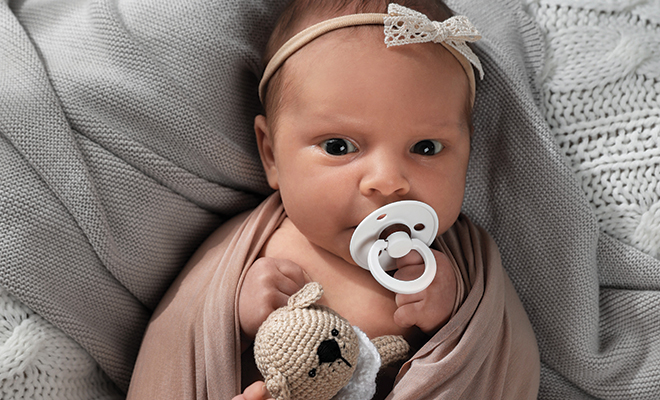
Binky Biases Busted
Pacifiers seem to be one piece of baby accoutrements never free from scrutiny. Depending on when and where you are, pacifiers have been blamed for poor oral hygiene, poor breastfeeding outcomes, misaligned teeth later in life and speech delays.
A lot of what we think we know about babies is what we’ve always known; it’s what we learn from our moms, our grandmas, our aunts and babies we’ve been around. Ancient wisdom and experience can be invaluable when it comes to babies, but they can also be bizarre. One example is a century-old rumor started by one odd woman demonizing pacifiers, and it’s continued to be a topic of debate for the last 113 years.
In 1900, Christian W. Meinecke patented the first truly modern pacifier. He called it the Baby Comforter. That could and should have been the end of it. After all, it was a huge improvement to the sugar teat of yesteryear, which involved letting infants suck on a ball made of sandy sugar and some mixture of animal fat or brandy that was then tied into a cloth. This seems like it might have caused several health problems, but I am not a doctor.
Unfortunately, people love to find new reasons to panic or shame moms, especially if they can use a ridiculous nom de plume. In 1909, Auntie Pacifier wrote to the New York Times and as far as anyone knows was the first person to claim that pacifiers were a “menace to dental health.” She went on to complain about “the persistent, and, among poorer classes, the universal sucking of a rubber nipple sold as a ‘pacifier.’” Perhaps she had misophonia, a strong, involuntary reaction to eating sounds, which includes the sound of sucking.
Pacifiers weren’t viewed any more favorably across the pond. In 1914, a doctor in London complained that they were unsanitary because the babies dropped the pacifiers and mothers often just wiped them on their shirts or sucked them off and put them back in their babies’ mouths. I don’t particularly condone this behavior, but I’d like to point out that in 1914 England, World War One was looming and pacifiers are a weird place to cast your scorn.
Yet here we are over a century later with people still Googling the question “Do pacifiers cause crooked teeth?” The overwhelming consensus today among dentists and pediatricians, as noted by the American Academy of Pediatric Dentistry, is, “As long as the child stops using the pacifier by age three; it’s fine.”
Many pediatric dentists note that most parents never have to intervene since most children give up their pacifiers on their own before the age of two. However, if you’re having a hard time separating your child from their pacifier, your dentist is there to help and can and will help you come up with a plan tailored to your child.
The idea that pacifiers interfere with breastfeeding isn’t as clear-cut as it used to be, either. It’s a complicated issue with many variables, but newer research is pointing more toward pacifiers being more likely to cause “nipple confusion” in the first 14 days as opposed to the first month as was previously believed. It also seems pacifier use may help mom and baby stick to exclusive breastfeeding for longer. Further studies are needed to confirm these hypotheses.
Now for the big reveal that may change the way you think about pacifiers forever; a landmark 1993 study indicates that the risk of sudden infant death syndrome, or SIDS, is reduced by 50 percent if a pacifier is used. This four-letter acronym is the most terrifying thing a new parent can imagine. The new parents can do everything right and still lose their baby without warning.
Scientists aren’t sure why pacifiers help cut SIDS risks but study after study has proven that they do. Interestingly, pacifiers seem to negate adverse sleeping situations, such as sleeping in bed with parents or siblings, a caregiver who smokes cigarettes, babies sleeping on their stomachs blankets or pillows and so on. A baby gets the protective benefits from pacifier use even if it falls out of the baby’s mouth while she sleeps. Every study I read while researching this article presented the efficacy of pacifiers at preventing SIDS differently but they were all statistically significant.
Of course, this isn’t a green light to toss your baby into the middle of the bed with eight pillows and three down comforters and light up a cigarette as long as your baby has a pacifier. That is still several different bad choices people should strive to avoid making.
Experts still recommend newborns sleep alone in their bed, with no pillows or blankets, on a hard mattress, in the bedroom where their caregiver sleeps, but now with the addition of a pacifier.
Sources: en.wikipedia.org, hurstpediatricdentistry.com, verywellfamily.com, researchoutreach.org, mayoclinic.org and scientificamerican.com.







